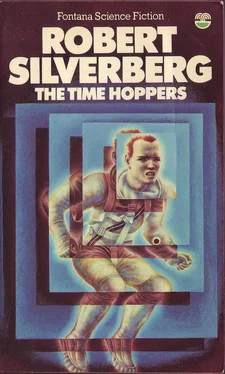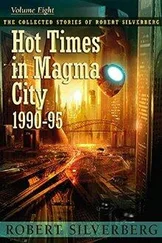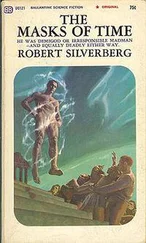Was it possible?
Had two or three hoppers already been thwarted in their documented escapes by some zealous official? And had fundamental changes in the historical patterns of the past five centuries resulted, changes that could never be observed? Kloofman felt an abrupt and fatiguing sense of the instability of the universe. Here he was, two thousand feet down in the solid earth, living as always at the bottom of civilization, for the High Government was the lowest level occupied, and he had known absolute power for decades of a kind never remotely comprehended by Attila or Genghis Khan or Napoleon or Hitler, and yet he could feel the roots of the past ripping loose like tom strings about him. It sickened him. Some faceless individual, a mere government man, could wreck everything in a harmless blunder, and there was nothing Kloofman could do to prevent it from happening. It might already have begun to happen.
I should never have embarked on this hopper enterprise, Kloofman thought.
But that was wrongheaded, he knew. He had done the right thing, but he had done it carelessly, without full consideration of the danger factors. Before turning his bureaucracy loose on catching the shipper of time-hoppers, he should have issued strict orders concerning interference with the past. He trembled at the thought of the vulnerability he had opened for himself. At any time since 2486, his entire edifice of power, so laboriously constructed over so many years, could have been wrecked by the blind whim of an underling.
The stabs of a dozen homeostatic injections reminded Kloofman that he was losing his calmness again.
“Get me Giacomin,” he said.
The viceroy entered a few moments later, looking puzzled at the peremptory recall. Kloofman leaned heavily forward, straining himself half out of the tank, causing the servomechanisms within his body to whine in tinny protest. “I just wanted to make certain,” he said, “that there was full understanding of my instruction. No interference with hopper departures. None. None whatever. Clear?”
“Of course.”
“Do I worry you, David? Do you think I’m a garrulous old man who ought to have his brain scraped? Let me tell you why I worry about this thing. I control the present and to some extent the future, right? Right. But not the past. How can I control the past? I see a whole segment of time that’s beyond my authority. I admit to being frightened. Maintain my authority over the past, David. See that it remains inviolate. What has happened must happen.”
“I’ve already taken steps to see that it will,” said Giacomin.
Kloofman dismissed him a second time, feeling reassured but not sufficiently so. He summoned Mauberley, the Class Two man in charge of running the Danton operation. As one who considered himself a quasi-immortal, Kloofman did not spend much time designating heirs apparent, but he had high respect for Mauberley, and regarded him as a possible eventual successor. Mauberley entered. He was sixty years old, vigorous and muscular, with a flat-featured face and wiry, thick hair. Kloofman briefed him on the new development. “Giacomin is already at work on the problem,” he said. “You work on it too. Redundancy, that’s the secret of effective government. Get Danton to make an official proclamation. Circulate it downwards through Class Seven. This is an emergency!”
Mauberley said, “Do you believe there have already been changes in the past as a result of contra-hopper activity?”
“No. But there could be. We’d never know.”
“I’ll deal with it,” he said, and left.
Kloofman rested. After a while, he had himself withdrawn from his nutrient bath and taken to his office. He had not been to the surface in sixteen years. The upper world had become slightly unreal to him; but he saw no harm in that, since he was well aware that to most of the inhabitants of the upper world he was slightly unreal, or more than slightly. Reciprocity, he thought. The secret of effective government. Kloofman lived in a complex of interlocking tunnels spreading out for hundreds of miles. At any given time, machines with glittering claws were energetically at work extending his domain. He hoped to have the world girdled with a continuous network of High Government access routes in another ten years or so. His personal Midgard Serpent of transportation. Strictly speaking, there was no need for it; he could govern just as effectively from a single room as from any point along a world-rimming tunnel. But he had his whims. What was the use of being the supreme leader of the entire world, Kloofman wondered, if he could not occasionally indulge a small whim?
He moved on purring rollers to the master control room and allowed his attendants to attach him to contact leads. It bored him to depend on words for his knowledge of external events. One of the many surgical reconstructs that had been performed on him over the years allowed a direct neural cut-in; Kloofman could and did enter directly into the data stream, becoming a relay facet of the computer web itself. Then, only then, did a kind of ecstasy overwhelm him.
He nodded, and the flow of data began.
Facts. Births and deaths, disease statistics, transportation correlations, power levels, crime rates. Synapse after synapse clenched tight as Kloofman absorbed it all. Far above him, billions of people went through their daily routines, and he entered in some way into the life of each of them, and they entered into his. His perceptions were limited, of course. He could not detect individual fluctuations in the data except as momentary surges. Yet he could extrapolate them. At this very instant, he knew, a hopper was departing for the past. A life was subtracted from the present. What about mass? Was it conserved? The data on planetary mass failed to take into account the possibility of a sudden and total subtraction. Two hundred pounds abruptly removed from now and thrust into yesterday—how could it be possible, Kloofman wondered? It was done, though. The records showed it. Thousands of hoppers thrust out of his time and into the time of his predecessors. How? How?
Peter Kloofman brushed the thought from his throbbing mind. It was an irrelevancy. What was relevant was the sudden, unthinkable possibility that the past might be altered, that all this might be taken away from him in a random fluctuation against which no defence existed. That struck horror into him. He filled his brain with data to drown out the possibility of total loss. He felt the onset of his delight.
Caesar, did you ever have the whole world running through your brain at once?
Napoleon, could you so much as imagine what it might be like to be plugged right into the master computers?
Sardanapalus, were there joys like this in Nineveh?
Kloofman’s bulky body quivered. The mesh of fine capillary wires just beneath his skin glowed. He ceased to be Peter Kloofman, world leader, lone human member of Class One, benevolent despot, sublime planner, the accidental inheritor of the ages. Now he was everyone who existed. A flux of cosmic power surged in him. This was the true Nirvana! This was the ultimate Oneness! This was the moment of full rapture!
At such a time, it was not possible to brood on how easily it could all be taken away from him.
Helaine Pomrath said, “Norm, who’s Lanoy?”
“Who?”
“Lanoy. L-A-N-”
“Where did you hear that name?”
She showed him the minislip and watched his face carefully. His eyes flickered. He was off balance.
“I found this in your tunic last night,” she said. “ ‘ Out of work, see Lanoy, ’ it says. I just wondered who he was, what he could do for you.”
“He—uh—runs some kind of employment bureau, I think. I’m not sure.” Pomrath looked thoroughly uncomfortable. “Somebody slipped that to me as I was coming out of the sniffer palace.”
Читать дальше












